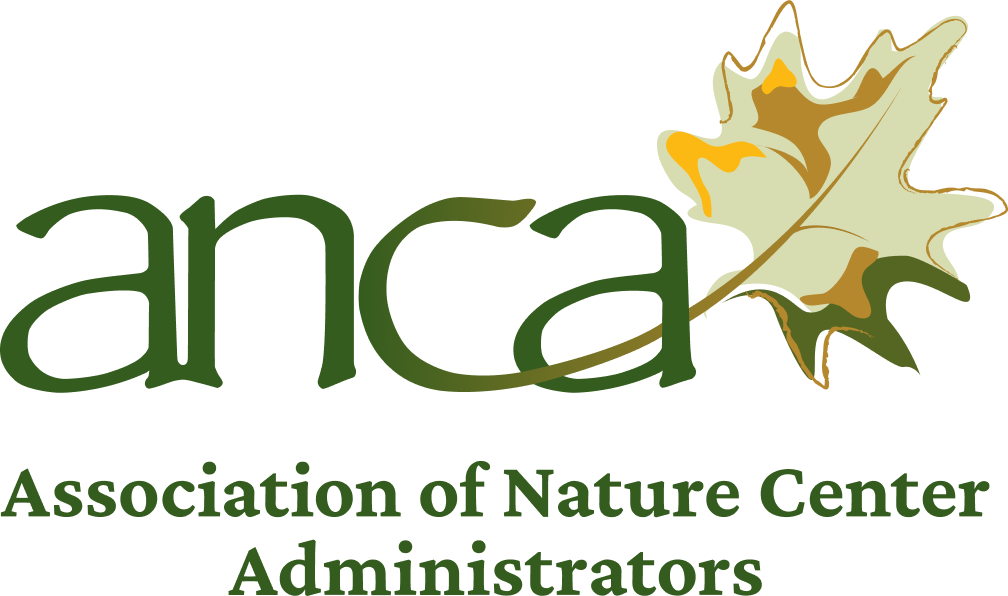ANCA’s Digital Journal: Directions
A distinguished resource for professionals at nature centers, outdoor schools, and related organizations,Directionsis the official digital journal of ANCA. From practical strategies for operations to innovative approaches in leadership, each issue explores the profession's current trends and best practices. See the journal here
Advertising space in Directions is available for businesses; see the options here.
Books
Director's Guide to Best Practices: Examples from the Nature Center and Environmental Learning Profession
by Norma Jeanne Byrd
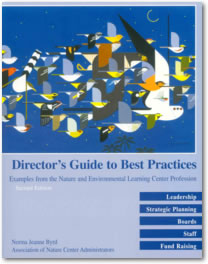 ANCA developed this book for busy directors and staff people with many roles and responsibilities, and it includes chapters on five essential areas: leadership, strategic planning, boards, staff, and fund raising. It is a handbook for those new to the profession, and will also challenge and inspire the most experienced directors and their staffs. ANCA members have also found it valuable to give to board members and volunteers. Directors from 23 states and 40 different facilities reviewed and commented on the chapter drafts and evaluated the book's effectiveness. Development of the book was made possible by the Institute of Museum and Library Services and Victor & Colleen Elderton. Second edition, published in 2000.
ANCA developed this book for busy directors and staff people with many roles and responsibilities, and it includes chapters on five essential areas: leadership, strategic planning, boards, staff, and fund raising. It is a handbook for those new to the profession, and will also challenge and inspire the most experienced directors and their staffs. ANCA members have also found it valuable to give to board members and volunteers. Directors from 23 states and 40 different facilities reviewed and commented on the chapter drafts and evaluated the book's effectiveness. Development of the book was made possible by the Institute of Museum and Library Services and Victor & Colleen Elderton. Second edition, published in 2000.
$25 plus shipping
Monographs
The Search for Extraordinary Leadership: Securing Your Next Executive Director
by Corky McReynolds
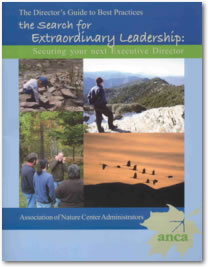 Developed to outline a best practices process to engage and complete a successful search and screen for a center's next extraordinary leader, this 42 page monograph includes what to look for in a new leader; how to prepare your center for successful change; protocols for searching, screening, and transitioning; and much more. Published in 2006.
Developed to outline a best practices process to engage and complete a successful search and screen for a center's next extraordinary leader, this 42 page monograph includes what to look for in a new leader; how to prepare your center for successful change; protocols for searching, screening, and transitioning; and much more. Published in 2006.
$5 plus shipping
Branding & Marketing Your Nature Center
by Greta Bolger
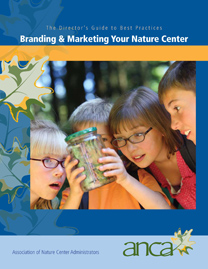 This 70-page monograph provides nature organizations with a set of best practices that can be used to increase visibility and impact within their communities and beyond. The Best Practices outlined here are intended to guide marketing professionals at all levels, as well as specialists from other disciplines, in the development of a unified marketing strategy and a cost-effective, measurable tactical plan. Published in 2009.
This 70-page monograph provides nature organizations with a set of best practices that can be used to increase visibility and impact within their communities and beyond. The Best Practices outlined here are intended to guide marketing professionals at all levels, as well as specialists from other disciplines, in the development of a unified marketing strategy and a cost-effective, measurable tactical plan. Published in 2009.
$5 plus shipping
Interpretive Design of Nature Centers: Buildings
by Donald Watson
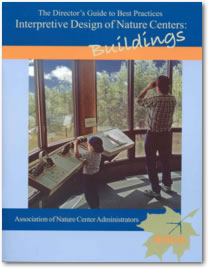 This 40-page monograph is for nature center administrators, board members, and staff involved with planning new sites and buildings and/or remodeling existing sites and buildings for interpretation, exhibits, and educational programs. Published in 2006.
This 40-page monograph is for nature center administrators, board members, and staff involved with planning new sites and buildings and/or remodeling existing sites and buildings for interpretation, exhibits, and educational programs. Published in 2006.
$5 plus shipping
Interpretive Design of Nature Centers: Exhibits
by Donald Watson
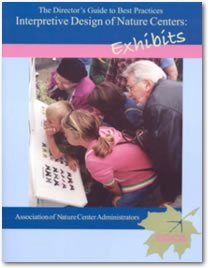 This 32-page monograph provides guidelines and recommendations for undertaking an exhibit design project in new or existing sites and spaces. Topics include interpretive planning, visitor studies, interpretive artifacts and anecdotes, outdoor exhibits and interpretive trails, and evaluation. Suggested formats are provided for selecting and managing exhibit consultants and coordinating exhibits with buildings and sites. Published in 2006.
This 32-page monograph provides guidelines and recommendations for undertaking an exhibit design project in new or existing sites and spaces. Topics include interpretive planning, visitor studies, interpretive artifacts and anecdotes, outdoor exhibits and interpretive trails, and evaluation. Suggested formats are provided for selecting and managing exhibit consultants and coordinating exhibits with buildings and sites. Published in 2006.
$5 plus shipping
Articles
Build Resiliency for the Challenge of Change
by Corky McReynolds
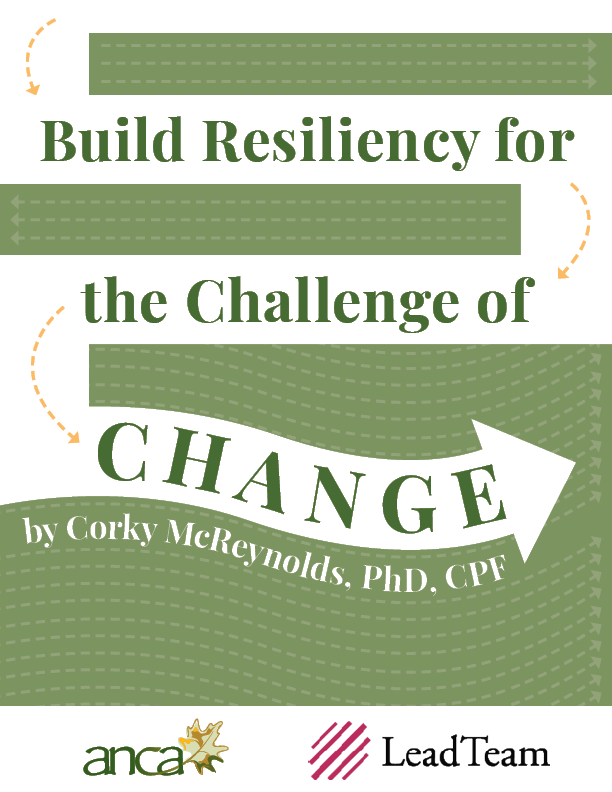 Change can be planned by or happen to an organization. When organizational change occurs, it can have a dramatic effect on its people, productivity, and processes. This change can be drastic for some and relatively easy going for others.This paper identifies Setting strategic direction, Creating a healthy culture, Practicing fiscal responsibility, and Investing in people as four core systems, that when functional and following best practices, will determine the capacity of an organization’s ability to endure, embrace, and empower change.
Change can be planned by or happen to an organization. When organizational change occurs, it can have a dramatic effect on its people, productivity, and processes. This change can be drastic for some and relatively easy going for others.This paper identifies Setting strategic direction, Creating a healthy culture, Practicing fiscal responsibility, and Investing in people as four core systems, that when functional and following best practices, will determine the capacity of an organization’s ability to endure, embrace, and empower change.
Research
The ANCA Blue Ribbon Report, May 2015
In 2014 ANCA commissioned the Blue Ribbon Report, a comprehensive report that explores what leaders in the field view as the societal and economic future of our industry over the next 25 years. The report identifies significant trends and developments and provides recommendations for how ANCA can continue to support the growth of nature centers in the future.
Read the full Research Report here and an article about the research here.
Major Themes:
- Theme 1: Nature centers will need to establish relevancy in an increasingly nature disconnected society.
- Theme 2: Nature centers will adapt funding for day to day operations and long-term sustainability.
- Theme 3: Nature center programming will evolve.
- Theme 4: Nature center professionals will develop modern skill sets.
- Theme 5: Nature centers will strengthen their properties.
Recommendations for ANCA:
- Support the development of nature centers into conservation and restoration leaders. Champion nature centers which have successfully integrated conservation and/or restoration ethics into their organizations. Develop best practices for nature centers supporting conservation and restoration in their communities.
- Lead the conversation about education and advocacy concerning climate change. Investigate how nature centers in currently impacted regions are beginning to address climate change. Provide spaces for directors to discuss how centers can and should react.
- Develop best practices for integrating technology into programming and business models. Champion nature centers which have integrated technology in significant ways. Due to the fast pace of innovation, focus on ways to leverage social media and mobile technology rather than specific devices such as iPads.
- Develop best practices for resiliency to future economic downturns. Identify lessons learned from nature centers that were affected by the recession.
- Support the promotion of the value of nature centers. Conduct evaluation and outcome research on nature centers. Develop best practices for promoting the value of nature centers in the community.
- Be a catalyst for collaboration.Champion nature centers which have successfully collaborated with other organizations to increase the scale of their impact. Develop best practices for collaborating to win larger foundation grants. Facilitate discussions on the potential for nature center consortiums and coalitions.
- Promote innovative programming.Champion nature centers which have created successful programs for high schoolers, college students, and adults. Champion programs which have successfully integrated issue analysis, field research, and citizen science.
- Explore the horizon beyond school programming. Facilitate discussions of the value of traditional school programs. Provide spaces for directors to discuss new models of programming.
- Promote boards reflective of their communities. Champion nature centers which have benefited from diverse, reflective boards.
Nature Centers & Communities Study, March 2016
Nature centers hold tremendous potential to serve as hubs for learning and connection, not only between people and nature, but also between fellow community members. This study examined the relationship between nature centers and the people living around them – including both people who visit and people who don’t visit but still perceive value in a nature center existing in their community.
Read the Final Report Narrative here and the Final Report here.
